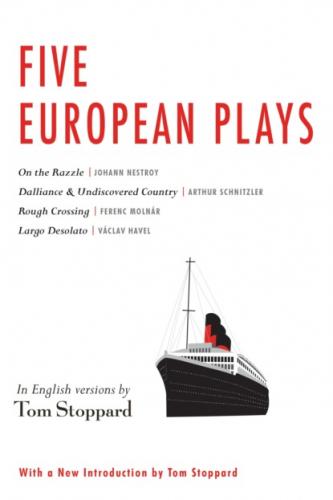From Johann Nestroy’s Einen Jux will er sich machen
Liebelei by Arthur Schnitzler
Das weite Land by Arthur Schnitzler
From Ferenc Molnár’s Játék a kastélyban
by Václav Havel
A translation when commissioned by a theatre is bespoke. There is no common principle uniting these five. Two of them, On the Razzle and Rough Crossing, are so free as to question their claim to be translations at all, yet they are unalike in the liberty they take. In the case of the other three, the goal was an English version as faithful to the original as the translator could make it, but by that measure the results in the event were various, too.
Undiscovered Country is somewhat shorter than the German, partly owing to a decision to perform the play with one intermission instead of Schnitzler’s two. As a translator I don’t recall feeling disturbed on behalf of the author by these cuts, nor by my willingness in rehearsal to alter Schnitzler here and there in small ways to sharpen the pace beyond strict fidelity. As a playwright, of course, I might disapprove but a lifetime in making theatre teaches a degree of latitude. Translating a play is not a job for linguists. This is a position no doubt easier to maintain as a translator of a play than as a playwright in translation. Once, in Italy, watching a play of my own I couldn’t help noticing that a very large chunk of my second act had gone missing. When I enquired about this, the disarming reply was, ‘We thought we would perform what we had time to rehearse.’ So, on the whole, I count Undiscovered Country among the respectful of these translations.
I hope Schnitzler would put Dalliance in the same company. But it has to be said that the third act of Liebelei has been moved from a flat in a poor quarter of Vienna to the wings of the opera house during a rehearsal, complete with tenor, soprano, conductor, stage manager, and unseen musicians. The change was made by the director, and I insist that it was a brilliant stroke. At the end of Dalliance the heroine Christine, one of Schnitzler’s ‘sweet girls’ who exist to be seduced by the young bloods of the town, learns that her lover has been killed in a duel, and she runs off intent on dying on his grave. The imported mise-en-scene did not seem out of place, Christine’s father being a musician at the opera, and the duet between the unwitting singers turned the screw on the scene. Perhaps it was the singing that pushed me to an excess of ‘translation’, Christine’s final speech of vituperation. Looking now at these three invented lines, I would say they observe the spirit if not the letter. And having said so, I must add that by coincidence I have been reading ‘a translation manifesto’, Sympathy for the Traitor by Mark Polizzotti (2018) which quotes a nineteenth century critic thundering, ‘The instant a man says, “I will give you the spirit of the author …” it is all over with the original. Translation, in such a case, becomes a mere cover for individual egotism and vanity.’ Touché! But I won’t go back on my words. I can hear myself now, in rehearsal, making the case for Christine putting the boot in on her exit. It was 1986, and I was in no doubt I was serving the play, the character, the author, and the times; thus perhaps adding presumption to egotism.
Undiscovered
